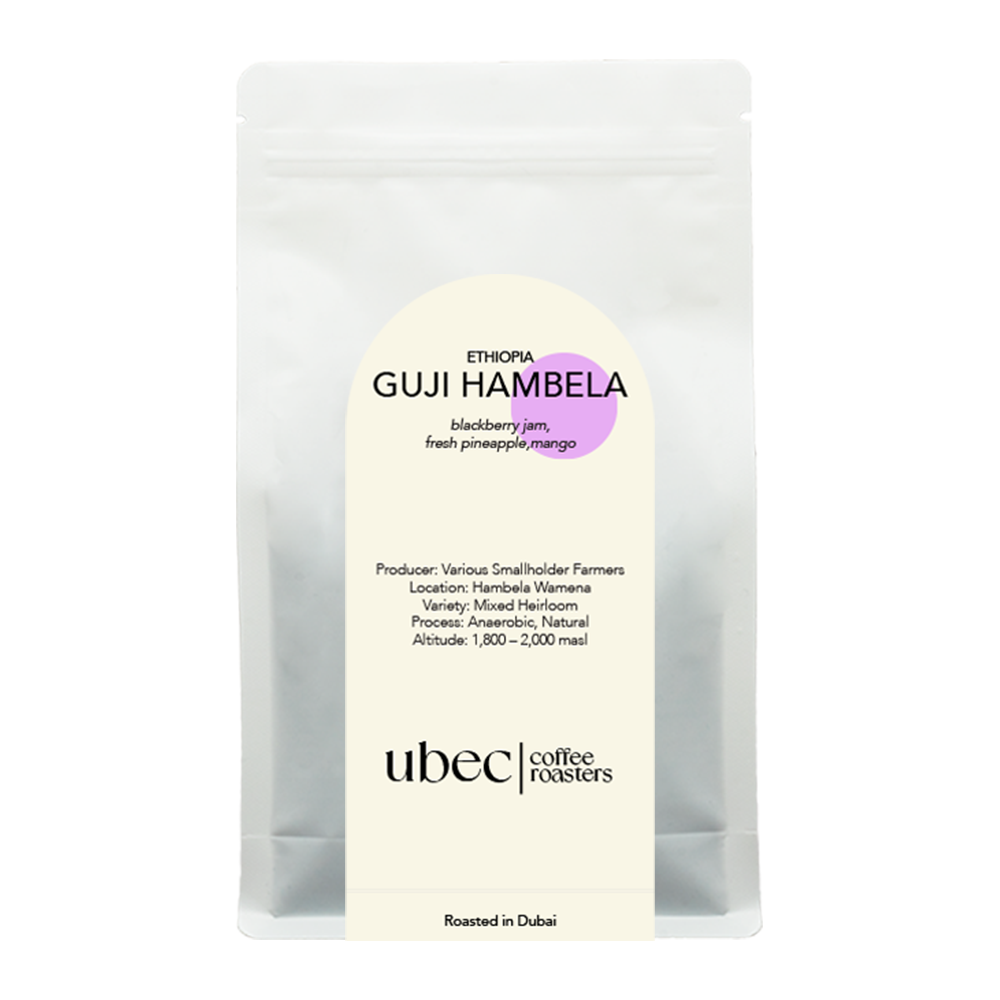UBEC COFFEE ROASTERS
Ethiopia, Hambela Guji
Ethiopia, Hambela Guji
Regular price
Dhs. 70.00
Regular price
Sale price
Dhs. 70.00
Unit price
per
Couldn't load pickup availability
Producer: Various small holder farmers
Location: Hambela Wamena
Variety: Mixed Heirloom
Process: Anaerobic Natural
Altitude: 1800 - 2000 MASL
Taste Profile: Blackberry Jam, Fresh Pineapple, Mango,
Hambela Wamena is a woreda within Guji Zone. The Guji Zone lies approximately 300 to 400 km south of Addis Ababa in the Oromia Region. In 2002, Guji itself detached from Yirgacheffe, which had previously been folded in with the Sidamo name. The Guji region takes its name from the Oromo people, a tribe that has farmed coffee on the land for generations.
Farming methods in Guji remain largely traditional. Guji farmers typically intercrop their coffee plants with other food crops. This method is common among smallholders because it maximizes land use and provides food for their families. In addition to remaining traditionally intercropped, most farms are also organic-by-default. Farmers in Guji typically use very few — if any — fertilizers or pesticides. Most farm work is done manually and very few tasks are mechanized, even during processing.
Due to the size of most plots, coffee is typically handpicked by landowners and their family. All coffee is selectively hand-harvested before being delivered to a collection center or directly to the washing station. At the washing station, coffee is sorted to remove damaged or underripe cherry. Cherry is then delivered to raised beds to dry under shade for 10 to 14 days. During this time, the cherry is regularly turned and hand-sorted several times to remove any damaged or discolored cherry. This level of labor and love results in a truly exquisite cup profile.
Location: Hambela Wamena
Variety: Mixed Heirloom
Process: Anaerobic Natural
Altitude: 1800 - 2000 MASL
Taste Profile: Blackberry Jam, Fresh Pineapple, Mango,
Hambela Wamena is a woreda within Guji Zone. The Guji Zone lies approximately 300 to 400 km south of Addis Ababa in the Oromia Region. In 2002, Guji itself detached from Yirgacheffe, which had previously been folded in with the Sidamo name. The Guji region takes its name from the Oromo people, a tribe that has farmed coffee on the land for generations.
Farming methods in Guji remain largely traditional. Guji farmers typically intercrop their coffee plants with other food crops. This method is common among smallholders because it maximizes land use and provides food for their families. In addition to remaining traditionally intercropped, most farms are also organic-by-default. Farmers in Guji typically use very few — if any — fertilizers or pesticides. Most farm work is done manually and very few tasks are mechanized, even during processing.
Due to the size of most plots, coffee is typically handpicked by landowners and their family. All coffee is selectively hand-harvested before being delivered to a collection center or directly to the washing station. At the washing station, coffee is sorted to remove damaged or underripe cherry. Cherry is then delivered to raised beds to dry under shade for 10 to 14 days. During this time, the cherry is regularly turned and hand-sorted several times to remove any damaged or discolored cherry. This level of labor and love results in a truly exquisite cup profile.


